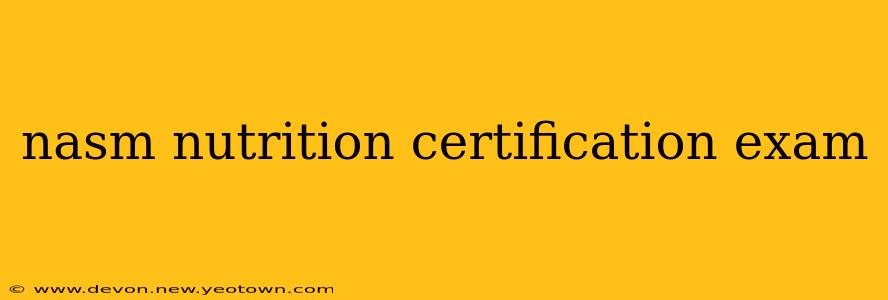The NASM (National Academy of Sports Medicine) Nutrition Certification is a highly respected credential for fitness professionals looking to enhance their expertise in nutritional guidance. But the exam? That’s a different beast entirely. This isn't your average multiple-choice test; it requires deep understanding, strategic preparation, and a healthy dose of perseverance. This guide will walk you through the process, answering your burning questions and equipping you with the knowledge to conquer the NASM nutrition certification exam.
Imagine this: You're in the final stretch of your fitness journey, ready to take the plunge and become a certified nutrition coach. You've poured over textbooks, devoured online resources, and practiced countless practice questions. The day arrives – the NASM Nutrition Certification Exam. The weight of your hard work rests on your shoulders. This is your moment to shine. But are you truly prepared?
This isn't just about memorizing facts; it's about understanding the principles behind them and applying that knowledge to real-world scenarios. Think of it as a culmination of everything you've learned, a test of your ability to connect the dots between nutrition, fitness, and overall well-being.
What's Covered in the NASM Nutrition Certification Exam?
The exam is designed to assess your proficiency across several key areas:
-
Foundational Nutrition Knowledge: This includes understanding macronutrients (carbohydrates, proteins, and fats), micronutrients (vitamins and minerals), and their roles in the body. You’ll need to grasp concepts like energy balance, metabolic processes, and dietary guidelines.
-
Nutritional Assessment: This section will test your ability to analyze a client’s dietary intake, identify potential deficiencies or excesses, and formulate personalized recommendations. Be prepared to interpret food labels, understand portion sizes, and apply different dietary assessment methods.
-
Weight Management Strategies: A large portion of the exam focuses on designing and implementing safe and effective weight management strategies. You'll need to know how to create calorie deficits or surpluses, understand different dieting approaches, and address psychological aspects of weight management.
-
Supplementation: The exam will delve into the appropriate use of nutritional supplements, covering topics like ergogenic aids, pre and post-workout nutrition, and the potential risks and benefits of various supplements. It’s crucial to understand evidence-based recommendations.
-
Special Populations: You’ll be expected to adapt your nutritional guidance for specific populations, including athletes, pregnant women, older adults, and individuals with specific medical conditions. This section emphasizes the importance of considering individual needs and limitations.
How Can I Prepare for the NASM Nutrition Certification Exam?
Preparation is key to success. Here are some strategies to help you ace the exam:
-
Thorough Review of Study Materials: The official NASM study materials are invaluable. Read through them thoroughly, taking notes and highlighting key concepts.
-
Practice Exams: Practice tests are crucial for identifying your weak areas and getting used to the exam format. Take advantage of practice exams provided by NASM or reputable third-party sources.
-
Focus on Application: Don't just memorize facts; try to understand how the concepts apply to real-world situations. This will help you answer application-based questions effectively.
-
Seek Clarification: If you encounter concepts you're struggling with, don't hesitate to seek clarification from your instructors, mentors, or other resources.
-
Create a Study Schedule: Develop a structured study plan that allows you to cover all the necessary topics systematically and leaves enough time for practice and review.
What are the Most Common Challenges Faced During the Exam?
Many candidates find certain areas more challenging than others:
-
Understanding the nuances of macronutrient ratios and their application to different fitness goals: This requires a deep understanding of metabolic processes and the body's response to different nutrient combinations.
-
Applying nutritional assessment techniques to diverse client profiles: Each individual's needs are unique, requiring you to analyze their specific circumstances and create a tailored plan.
-
Differentiating between evidence-based recommendations and unsubstantiated claims: This requires critical thinking and the ability to filter through a vast amount of information, often conflicting, from various sources.
How Long Does it Take to Study for the NASM Nutrition Certification?
The time required depends entirely on your learning style and background. Some individuals might require several months of focused study, while others might be ready in a shorter time frame. Dedicate sufficient time for thorough preparation.
What is the Pass Rate for the NASM Nutrition Certification Exam?
NASM does not publicly release its pass rates, but consistent effort and diligent study will greatly improve your chances of success.
This journey to becoming a certified nutrition coach through NASM is a challenging but incredibly rewarding one. By embracing a structured study plan, focusing on understanding the underlying principles, and practicing consistently, you can confidently face the NASM nutrition certification exam and achieve your goals. Remember, success comes from preparation, perseverance, and a deep commitment to mastering the subject matter. Your future clients will thank you for it.

